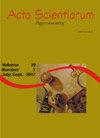Multi-trait multi-environment models for selecting high-performance and stable eucalyptus clones
IF 1.2
4区 农林科学
引用次数: 0
Abstract
Multi-trait multi-environment (MTME) models were fitted to eucalyptus breeding trials data to assess residual variance structure, genetic stability and adaptability. To do so, 215 eucalyptus clones were evaluated in a randomized complete block design with 30 replicates and one plant per plot in four environments. At 36 months of age, tree diameter at breast height (DBH) and pilodyn penetration (PP) were measured. Two MTME models were fitted, for which residuals were considered homoscedastic and heteroscedastic, with the best MTME model selected using Bayesian information criterion. The harmonic mean of the relative performance of the genotypic values (HMRPGV) was used to determine stability and adaptability. Of the two models, the heteroscedastic MTME model had better fit and provided greater accuracy. In addition, genotype-by-environment interaction was complex, and there was low genetic correlation between DBH and PP. Rank correlation between the clones selected by the MTME models was high for DBH but low for PP. The HMRPGV facilitated clone selection through simultaneous evaluation of stability, adaptability, and productivity. Thus, our results suggest that heteroscedastic MTME model / HMRPGV can be efficiently applied in the genetic evaluation and selection of eucalyptus clones.高性能稳定桉树无性系选择的多性状多环境模型
采用多性状多环境(MTME)模型拟合桉树育种试验数据,评价残差结构、遗传稳定性和适应性。为此,采用随机完全区组设计,在4种环境下,30个重复,每个地块1株,对215个桉树无性系进行评价。在36月龄时,测定树胸径(DBH)和树冠穿透率(PP)。拟合残差分别考虑同方差和异方差的MTME模型,利用贝叶斯信息准则选择最佳MTME模型。采用基因型值相对性能的调和平均值(HMRPGV)来确定稳定性和适应性。两种模型中,异方差MTME模型拟合效果较好,精度较高。此外,基因型-环境相互作用复杂,胸径与PP之间的遗传相关性较低,MTME模型选择的克隆之间的等级相关性在胸径上较高,而在PP上较低。HMRPGV通过同时评估稳定性、适应性和生产力来促进克隆选择。因此,异方差MTME模型/ HMRPGV可以有效地应用于桉树无性系的遗传评价和选择。
本文章由计算机程序翻译,如有差异,请以英文原文为准。
求助全文
约1分钟内获得全文
求助全文
来源期刊

Acta Scientiarum-agronomy
AGRONOMY-
CiteScore
2.30
自引率
0.00%
发文量
45
期刊介绍:
The journal publishes original articles in all areas of Agronomy, including soil sciences, agricultural entomology, soil fertility and manuring, soil physics, physiology of cultivated plants, phytopathology, phyto-health, phytotechny, genesis, morphology and soil classification, management and conservation of soil, integrated management of plant pests, vegetal improvement, agricultural microbiology, agricultural parasitology, production and processing of seeds.
 求助内容:
求助内容: 应助结果提醒方式:
应助结果提醒方式:


